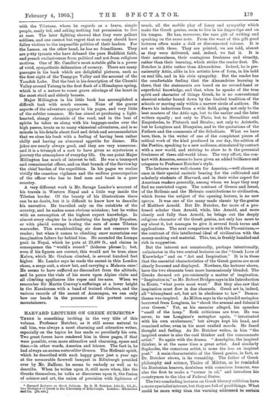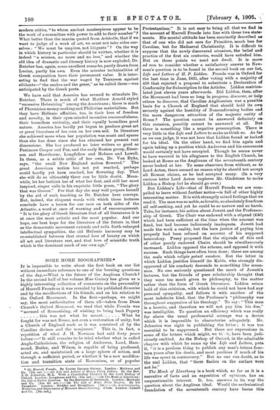HARVARD LECTURES ON GREEK SUBJECTS.* THERE is something inviting in
the very title of this volume. Professor Butcher, as it still seems natural to call him, was always a most charming and attractive writer, especially on the topics he has made so peculiarly his own. Two great forces have rendered him in these pages, if that were possible, even more attractive and charming, space and time,—in other words, America and leisure. The fact is, he had always an anima naturaliger Graeca. The Hellenic spirit, which he described with such happy grace just a year ago at the memorable farewell banquet in Edinburgh presided over by Mr. Balfour, he seems to embody as well as to describe. When he writes upon it, still more when, like the Greeks themselves, he talks or discourses upon it, the fusion of science and art, the union of precision with lightness of * Harvard Lectures on Greek Subjects. By B. H. Butcher. Litt.D., LL.D., late Professor of Greek in the University of Edinburgh, London Macmillan and Co. E7a pet.]
touch, all the mobile play of fancy and sympathy which make the Greek genius, seem to live in his finger-tips and on his tongue. He has, moreover, the rare gift of writing and speaking on the same note. From the want of this gift good lectures often make a dull or disconnected volume. It is not so with these. They are printed, we are told, almost as they were delivered, and, indeed, we feel it. It is their naturalness, their contagious freshness and vivacity, rather than their learning, which strike the reader first. Dr. Butcher is Attic rather than Alexandrine. Indeed, he is pre- eminently Attic, alike in his artistic love of form, in his hold on real life, and in his civic sympathy. But the reader has the comfortable feeling that the Alexandrine learning is there, that the statements are based on no second-hand or superficial knowledge, and that, when he speaks of the true spirit and character of things Greek, he is no conventional olassical scholar bound down by the limited tradition of the schools or moving only within a narrow circle of authors. He draws his inductions from a wide field, going not only to the best masters of the Attic age, but to the earlier and the later writers equally ; not only to Plato, but to Heraclitus and Empedocles, to Plutarch and Strabo ; not only to Aristotle, but to Longinus and Dionysius, and to the quotations of the Fathers and the comments of the Scholiasts. What we have here, then, is the writer of one of the completest pieces of critical work of the kind produced in our day, the edition of the Poetics, speaking to a new audience, stimulated by contact with a new world, and striving to show to it the perennial freshness of these old-world ideas. The very effort, the con- tact with America, seems to have given an added brilliance and crispness to Professor Butcher's style.
The lectures were well chosen for America,—well chosen at once in their special esoteric bearing for the cultivated and scholarly students of Harvard, and in their wider aspect for American readers generally, among whom we hope they may find no restricted vogue. The contrast of Greece and Israel, of the Hellenic and the Hebraic contributions to civilisation, which forms the subject of the opening lecture, is no new aper cu. It was one of the many made classic by the genius of Matthew Arnold. But Dr. Butcher, far more of a pro- fessed scholar than Arnold, while, like Arnold, and more closely and fully than Arnold, he brings out the deeply religious character of the Greek genius, not only has more to say about it, but manages to give it. several fresh turns and applications. The next comparison is with the Phoenicians,— the contrast of this intellectual ideal of civilisation with the money-making and material. This, too, is freshly handled and rich in suggestion.
But the interest not unnaturally, perhaps intentionally, culminates in the two central lectures on the " Greek Love of Knowledge " and on " Art and Inspiration." It is in these that the essential characteristics of the Greek genius are most clearly focussed and displayed. Nowhere, the lecturer shows, have the two elements been more harmoniously blended. The Greeks deemed art pre-eminently a matter of inspiration. "Inspiration is," as Mr. Robert Bridges says in his Introduction to Keats, " what poets most want." But they also saw that inspiration must flow in due channels. Greek art is, indeed, all " triumphant art, but art in obedience to law." Demos- thenes was inspired. As Milton says in the splendid metaphor borrowed from Longinus, he " shook the arsenal and fulmin'd over Greece." Yet, as his enemies alleged, his speeches "smell of the lamp." Both criticisms are true. He was never, to use Longinus's metaphor again, " intoxicated with his own exuberance," but always kept his head, and remained sober, even in his most exalted moods. He fused thought and feeling. As Dr. Butcher writes, in him " the inspired orator is also the cool thinker and the consummate artist." So again with the drama. " Aeschylus, the inspired thinker, is at the same time a great artist. And similarly Sophocles, the conscious artist, is none the less an inspired poet." A main characteristic of the Greek genius, in fact, as Dr. Butcher shows, is its versatility. The father of Greek philosophy and science, Thales of Maus, as he reminded his Bostonian hearers, doubtless with conscious humour, was also the first to make a "corner in oil," and introduce his countrymen to the idea of Federal States.
The two concluding lectures on Greek literary criticism have a more specialist interest, but they are full of good things. What could be more witty than the warning addressed. to certain
modern critics, "to whom ancient masterpieces appear to be the work of a committee with power to add to their number"? What better than the maxim quoted from Aristotle, that if we want to judge of a work of art, we must not take sides our- selves : " We must be umpires, not litigants " ? On the way in which history in particular should be written, whether it is indeed " a science, no more and no less," and whether the old idea of dramatic and literary history is now exploded, Dr. Butcher has, again, some excellent remarks, partly drawn from Lucian, partly his own. Even the minuter technicalities of Greek composition have their permanent value. It is inter- esting to find that the war waged by Tennyson against sibilants—" the snakes and the geese," as he called them—was anticipated by the Greek poets.
We have said that America has seemed to stimulate Dr. Butcher. There is much of what Matthew Arnold styled "excessive Hebraizing" among the Americans ; there is much of Phoenician money-making and Philistine materialism. But they have Hellenic affinities, too, in their love of freedom and novelty, in their open-minded inventive resourcefulness, their boundless curiosity, and their equally boundless good nature. America has hardly yet begun to produce great art or great literature of her own on her own soil. In literature she achieved more when her population was scant and sparse than she has done since she has attained her present vast dimensions. She has produced no later writers so good as Fenimore Cooper and Poe, and the early Boston group, Emer- son and Hawthorne, Longfellow and Holmes and Lowell. In them, as a subtle critic of her own, Dr. Van Dyke, says, " the small New England nation flowered." The great American nation has not yet reached, perhaps could hardly yet have reached, her flowering day. That she will do so ultimately there can be little doubt. Mean- while, let her bethink her of what her first, and still her most inspired, singer calls in his exquisite little poem, " The glory that was Greece." For that day she may well prepare herself by the aid of such teaching as Dr. Butcher here conveys. But, indeed, the eloquent words with which these lectures conclude have a lesson for our race on both sides of the Atlantic, a word at once of warning and of encouragement. " It is the glory of Greek literature that of all literatures it is at once the most artistic and the most popular. And our hope, our best hope for the literature of the future is, that as the democratic movement extends and calls forth enlarged intellectual sympathies, the old Hellenic harmony may be re-established between that eternal love of beauty on which all art and literature rest, and that love of scientific truth which is the dominant mark of our own age."











































 Previous page
Previous page